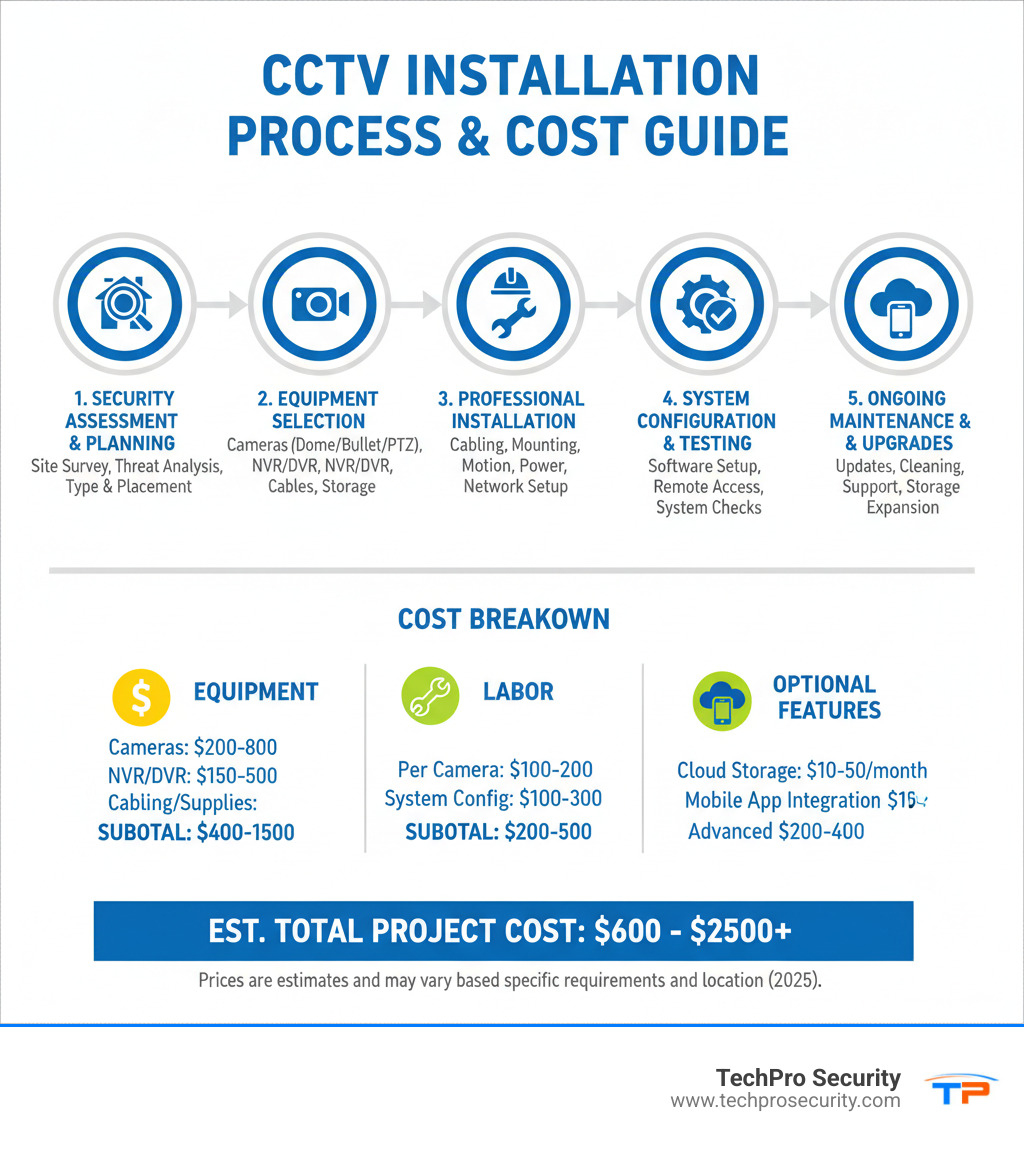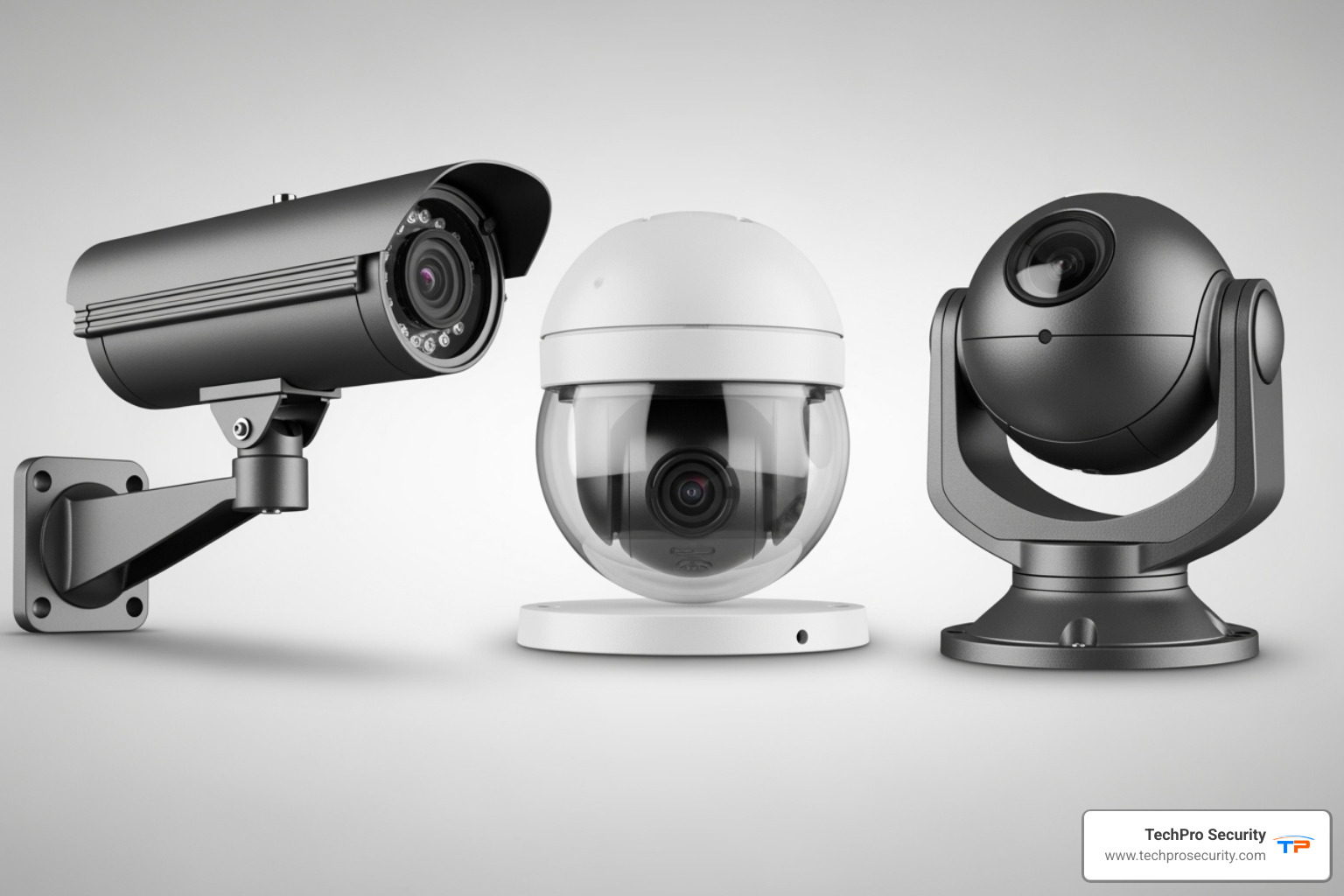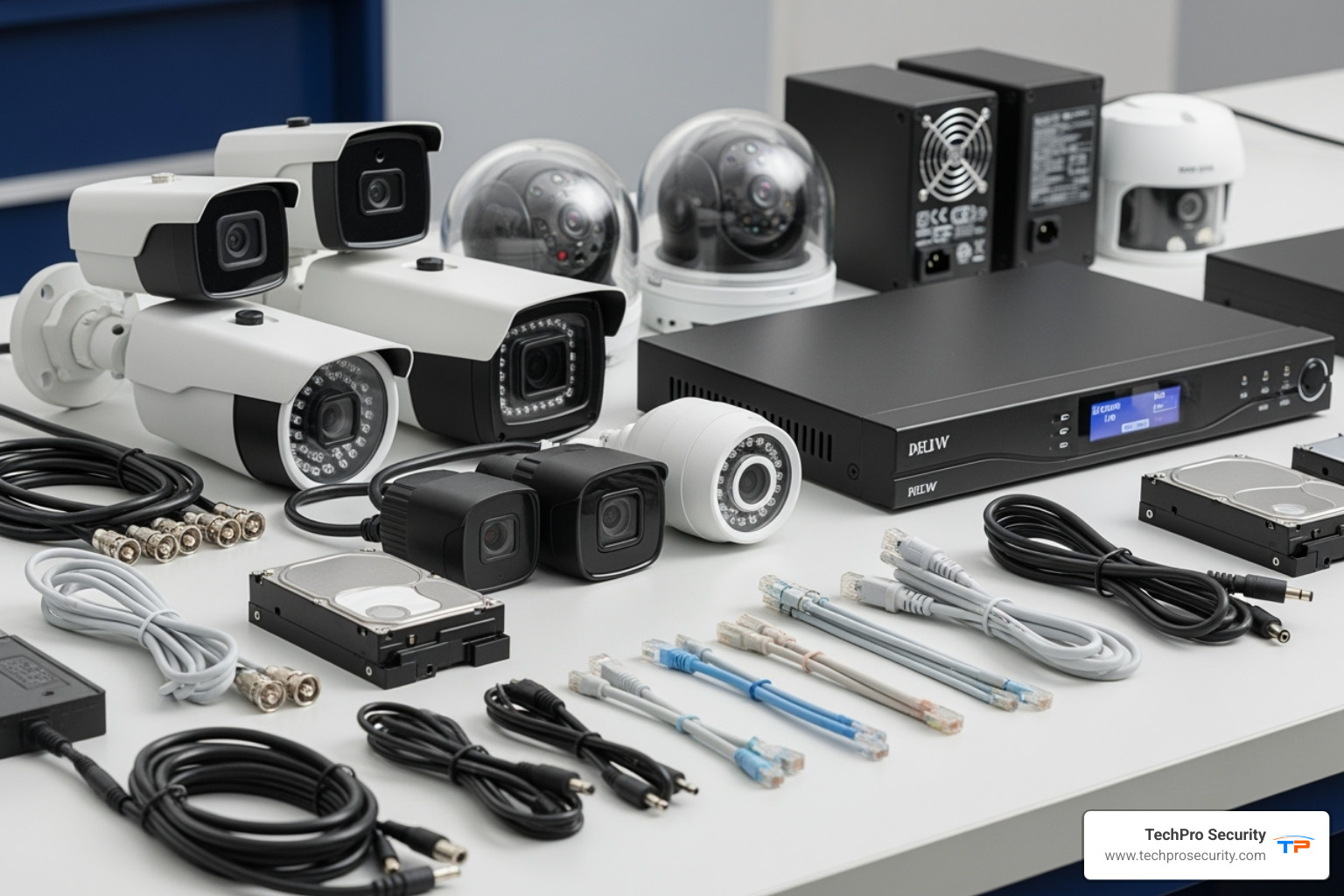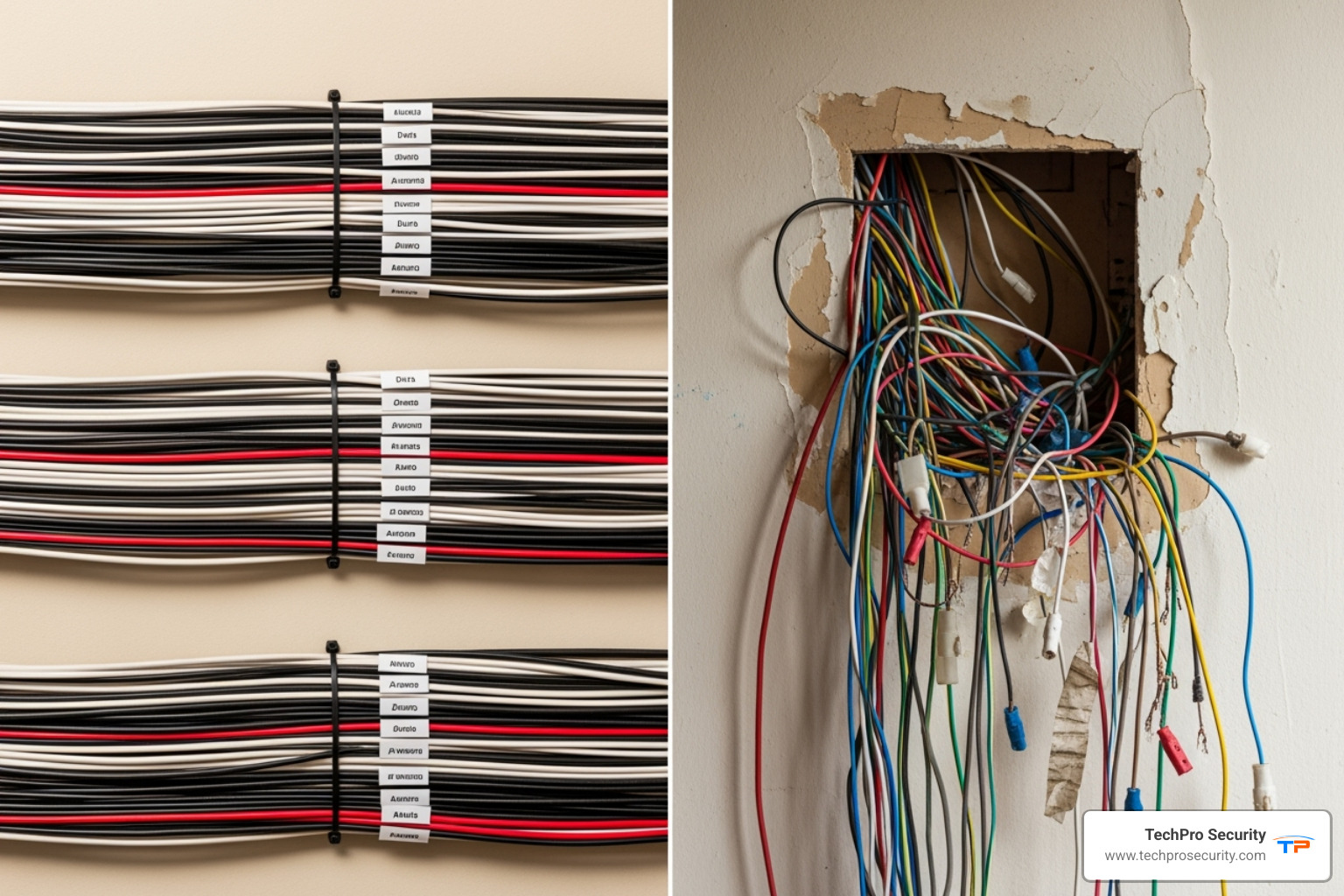CCTV Installation: Comprehensive 2025 Guide
Why CCTV Installation is Essential for Modern Home Security
CCTV installation is a critical investment for South Florida homeowners and businesses. Security camera systems serve as a first line of defense, providing 24/7 monitoring, deterring criminal activity, and delivering invaluable peace of mind.
Quick CCTV Installation Overview:
- Average Cost: $594 to $2,039 for complete systems
- Professional Installation: $100-$200 per camera in labor costs
- DIY Savings: 40-60% reduction in total project costs
- System Types: Analog (DVR) or IP cameras (NVR)
- Key Components: Cameras, recording device, storage, cabling, power supply
- Installation Time: 1-2 days for professional setup of 4-8 cameras
Statistics highlight the importance of surveillance. Businesses with visible CCTV can see a 22% drop in theft, and the video surveillance market is projected to reach $63 billion by 2023. For homeowners, the average installation costs around $1,297, an investment that can increase property value and provide crucial evidence.
Modern CCTV systems offer features once reserved for high-end commercial use, including 4K resolution, infrared night vision, motion detection alerts, and remote viewing via smartphone apps. The technology has evolved to meet diverse security needs and budgets, with options for reliable wired cameras or flexible wireless systems.
I’m Brad Besner, founder of Techpro Security Products. Since 2007, I’ve specialized in residential and commercial CCTV installation in South Florida. Our systems have prevented hundreds of intrusions, and I’ll share our expert insights to help you protect your property.

Understanding Your CCTV System Options
Choosing the right CCTV installation system is easier when you understand the main options. The two primary types are Analog CCTV (using a DVR) and IP Camera Systems (using an NVR).
Analog CCTV systems are the traditional, budget-friendly choice. Analog cameras send video via coaxial cables to a Digital Video Recorder (DVR). They provide standard definition to 1080p video, which is adequate for many basic surveillance needs.
IP Camera Systems are the modern standard, offering advanced features and superior video quality. These digital cameras send high-resolution video over a network to a Network Video Recorder (NVR), delivering stunning 4K to 8K video quality for capturing fine details.
The key differences are video quality and scalability. While analog is limited to 1080p, IP cameras provide sharper images for identifying faces or license plates. IP systems are also more flexible to expand, as they use existing network infrastructure.
| Feature | Analog CCTV (DVR) | IP Camera System (NVR) |
|---|---|---|
| Camera Type | Analog | Digital (IP) |
| Cabling | Coaxial cables | Ethernet cables (Cat5e/Cat6) |
| Recording Device | Digital Video Recorder (DVR) | Network Video Recorder (NVR) |
| Video Quality | Standard Definition to 1080p | High Definition (1080p) to 4K/8K |
| Power | Separate power cable or Siamese cable | Often Power over Ethernet (PoE) |
| Features | Basic recording, limited analytics | Advanced analytics (motion, facial rec.), remote access |
| Scalability | Limited by DVR channels | Highly scalable via network infrastructure |
| Cost | Generally lower initial cost | Higher initial cost, more feature-rich |
Next, you’ll decide between wired and wireless setups, a choice of reliability versus flexibility.
Wired systems are the most dependable, connecting cameras with physical cables that are secure from hacking and immune to Wi-Fi interference. The CCTV installation is more involved, often requiring professional cable runs. Equipment costs range from $150 to $450 per camera, plus installation.
Wireless systems offer maximum installation flexibility, making them ideal for renters or difficult-to-wire locations. However, they depend on Wi-Fi reliability, can suffer from signal interference, and may require battery changes. Professional-grade wireless models can cost $400 or more.
We typically recommend wired systems for permanent installations in South Florida to ensure maximum reliability.
Finally, choose your camera style. Bullet cameras are highly visible and cylindrical, making them an excellent crime deterrent for outdoor areas like driveways. Most include infrared for night vision.
Dome cameras are more subtle. Their dome shape blends into the surroundings and conceals the camera’s direction. They are often vandal-resistant, making them suitable for areas prone to tampering.
PTZ (Pan-Tilt-Zoom) cameras offer advanced capabilities. They can be remotely controlled to pan, tilt, and zoom, allowing one camera to cover large areas like parking lots. Expect to invest $400 to $500 or more per PTZ camera, but their coverage can replace multiple fixed cameras.
At TechPro Security, we help South Florida clients steer these choices. For more details, visit our guide on security camera installation.

Essential Components and Tools for a Complete Setup

A successful CCTV installation requires several key components working in harmony. While cameras are the most visible part, the supporting equipment is just as crucial.
- Security Cameras: The eyes of your system, available in analog or IP, and various styles like bullet or dome.
- Recording Device (DVR/NVR): The brain of the system, processing and storing video. A DVR is for analog cameras, and an NVR is for IP cameras.
- Data Storage: You have two main options. Hard drives provide local storage in your DVR/NVR, and we recommend enough capacity for at least 30 days of footage. Cloud storage offers off-site backup for a monthly fee ($10-$30 per camera), protecting your recordings even if the physical equipment is stolen. Learn more about our cloud backup options.
- Cabling: Coaxial cables are used for analog systems, while Ethernet cables (Cat5e/Cat6) are for IP cameras. Power over Ethernet (PoE) technology simplifies installation by sending data and power through a single Ethernet cable.
- Power Supply: Wired systems connect to your electrical supply, often simplified by PoE. Some wireless cameras use batteries that require regular maintenance.
- Monitors: A dedicated screen for viewing live feeds and reviewing recorded footage.
For a DIY installation, you’ll need the right tools. Essential items include drills, screwdrivers, wire strippers, crimping tools, fish tape (for running cables through walls), levels, measuring tools, and cable testers. Always use a sturdy ladder and proper safety gear.
While the right tools make DIY possible, a professional setup saves time and prevents common mistakes. Often, the best tool is knowing when to call an expert!
Breaking Down the Cost of CCTV Installation
Understanding the cost of CCTV installation is crucial. The average installation costs about $1,297, with most homeowners spending between $594 and $2,039. At TechPro Security, we provide transparent pricing for every project.
Several factors influence the final cost:
-
Number of Cameras: This is the biggest cost driver. Each camera and its installation typically costs between $100 and $500.
-
Camera Quality and Type: A basic dome camera might cost $100 to $400, while a high-end PTZ camera can be $400 to $500 or more. Higher resolution, like 4K, increases the price but provides valuable clarity.
-
Labor Costs: Professional installation adds $100 to $200 per camera. This fee covers expert camera placement, clean wiring, and proper system configuration.
-
Wired vs. Wireless: Wired systems may have higher labor costs for running cables but often use slightly cheaper cameras ($150-$450 each). Wireless cameras can cost up to $400 for premium models, but installation is quicker.
-
Advanced Features: Features like premium color night vision ($50-$100/camera), smart motion detection ($50-$300/feature), and facial recognition ($250-$400/camera) add to the total cost.
Be aware of additional costs. Subscription fees for cloud storage can run $10 to $30 per camera monthly. A PoE switch for an IP system may cost $100 to $400. Permits for commercial properties in South Florida can range from $25 to $300. Finally, budget $100 to $400 annually for future maintenance. Our security maintenance page has more details.
To get an accurate estimate, consider your specific needs, such as the coverage area and required video detail. We offer free consultations to help you find the right balance between security and budget.
Professional vs. DIY: Which Installation Path is Right for You?
For CCTV installation, you can choose between a DIY approach and professional service. The decision depends on your technical skill, budget, time, and system complexity.
If you’re comfortable with basic electrical and networking tasks, a simple wireless system may be a feasible DIY project. However, for more complex wired systems, professional help is often the better choice. While DIY can save 40-60% on labor, professional installation includes warranties and support that provide long-term value. Professionals can complete a typical installation in 1-2 days, saving you significant time and effort.

The Benefits of Professional CCTV Installation
- Expertise: Professionals strategically place cameras to eliminate blind spots, considering sight lines, lighting, and criminal behavior.
- Time Savings: A professional team can complete most residential installations in 1-2 days, a fraction of the time a DIY project might take.
- Warranty and Support: Our installations come with a commitment to keep your system working, including free US-based support.
- System Integration: We can integrate your cameras with access control, automatic gates, and other features to create a comprehensive security ecosystem. Our professional AV installation experience ensures seamless integration.
- Guaranteed Performance: We ensure your system meets industry standards, is properly weatherproofed, and works as intended from day one.
The DIY Approach to CCTV Installation
The main appeal of the DIY route is the cost savings on labor and the customization control it offers. However, it comes with challenges.
DIY requires knowledge of basic electrical work and, for IP systems, networking fundamentals like IP addressing and port forwarding. The potential pitfalls are significant:
- Incorrect Placement: A common mistake that leads to blind spots or useless footage.
- System Vulnerabilities: Improperly configured networks can be hacked, compromising your security.
- No Professional Support: Troubleshooting issues on your own can be frustrating and time-consuming.
While DIY is an option for simple setups, most South Florida properties benefit from the reliability and peace of mind of a professional CCTV installation.
Frequently Asked Questions about CCTV Installation
Here are answers to some of the most common questions we receive about CCTV installation in South Florida.
How much does it cost to install 4 security cameras?
A four-camera system typically costs between $800 and $2,000 for a complete installation. The price varies based on several factors:
- Camera Quality: Basic 1080p cameras are less expensive than 4K models with advanced features.
- Installation Complexity: Difficult cable runs or mounting locations increase labor costs.
- Wired vs. Wireless: Wireless cameras can be pricier, while wired systems have higher labor costs but often provide better long-term value.
Professional labor generally costs $100 to $200 per camera, meaning $400 to $800 in labor for a four-camera system, plus the cost of equipment.
Is it better to have wired or wireless security cameras?
The best choice depends on your priorities.
Wired systems are our top recommendation for permanent installations due to their higher reliability and improved security. The physical connection is immune to Wi-Fi interference and is harder to hack. Power over Ethernet (PoE) simplifies the setup by using a single cable for power and data. The main downside is the higher upfront cost for professional installation.
Wireless systems offer easier installation and flexible placement, making them ideal for renters or locations where running cables is impractical. However, they are susceptible to signal interference and often rely on batteries that need regular changing, which can be inconvenient in the South Florida climate.
For long-term security, wired systems are generally more reliable, but wireless can be effective in specific scenarios.
Can a CCTV system work without an internet connection?
Yes. This is a common misconception. Most CCTV systems record locally to a DVR or NVR with a hard drive, meaning they continue to record even if the internet is down. You can view footage by connecting a monitor directly to the recorder.
An internet connection is only essential for features like remote viewing from your phone, receiving mobile alerts, and using cloud storage for off-site backups.
A well-designed system ensures your core security recording is always active, regardless of internet status. We recommend local storage as the primary recording method, with cloud backup as a secondary layer of protection.
Conclusion
This guide has provided a roadmap for your CCTV installation, covering system types, costs, components, and the pros and cons of professional vs. DIY approaches.
The key takeaway is that planning is crucial. Before starting, assess your property’s vulnerable areas, define your security needs, and establish a budget that includes potential ongoing costs. Deciding between a reliable wired system and a flexible wireless one, or between a basic analog setup and a feature-rich IP system, will determine your project’s success.
It’s vital to weigh costs against benefits. While professional installation has a higher upfront cost, the value of expert camera placement, guaranteed performance, and ongoing support is significant. A poorly installed system is no bargain.
At TechPro Security, we understand the unique security challenges of South Florida. We’ve corrected many DIY installations that failed when they were needed most. As your local experts, we bring years of experience to every project, from Coral Springs homes to Miami businesses.
We design custom solutions custom to your property and budget, backed by extensive warranties and free US-based support. Don’t leave your security to chance. Let us help you build a reliable surveillance system that provides true peace of mind.

